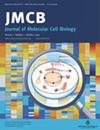吲哚美辛通过抑制 IRF3 的核转位抑制细胞质核酸刺激的免疫反应
IF 5.3
2区 生物学
Q2 CELL BIOLOGY
引用次数: 0
摘要
细胞膜核酸的识别会触发 DNA/RNA 传感器-IRF3 轴介导的 I 型干扰素(IFNs)的产生,IFNs 是抗病毒免疫反应所必需的。然而,这些信号通路的不适当激活与自身免疫疾病有关。在这里,我们报告了一种广泛使用的非甾体抗炎药物--吲哚美辛能抑制核酸触发的 IFN 生成。我们发现,吲哚美辛能有效阻断 DNA 和 RNA 刺激的 IFN 表达。有趣的是,吲哚美辛还能抑制IRF3在细胞核酸识别后的核转位。重要的是,在细胞系和艾卡迪-古蒂耶尔综合征小鼠模型中,吲哚美辛能减弱自身 DNA 诱导的自身免疫反应。因此,我们的研究揭示了吲哚美辛以前未知的功能,并为细胞核酸刺激的自身免疫提供了一种潜在的治疗方法。本文章由计算机程序翻译,如有差异,请以英文原文为准。
Indomethacin restrains cytoplasmic nucleic acid-stimulated immune responses by inhibiting the nuclear translocation of IRF3
The recognition of cytosolic nucleic acid triggers the DNA/RNA sensor–IRF3 axis-mediated production of type I interferons (IFNs), which are essential for antiviral immune responses. However, the inappropriate activation of these signaling pathways is implicated in autoimmune conditions. Here, we report that indomethacin, a widely used nonsteroidal anti-inflammatory drug, inhibits nucleic acid-triggered IFN production. We found that both DNA- and RNA-stimulated IFN expression can be effectively blocked by indomethacin. Interestingly, indomethacin also prohibits the nuclear translocation of IRF3 following cytosolic nucleic acid recognition. Importantly, in cell lines and a mouse model of Aicardi–Goutières syndrome, indomethacin administration blunts self-DNA-induced autoimmune responses. Thus, our study reveals a previously unknown function of indomethacin and provides a potential treatment for cytosolic nucleic acid-stimulated autoimmunity.
求助全文
通过发布文献求助,成功后即可免费获取论文全文。
去求助
来源期刊

Journal of Molecular Cell Biology
CELL BIOLOGY-
CiteScore
9.60
自引率
1.80%
发文量
1383
期刊介绍:
The Journal of Molecular Cell Biology ( JMCB ) is a full open access, peer-reviewed online journal interested in inter-disciplinary studies at the cross-sections between molecular and cell biology as well as other disciplines of life sciences. The broad scope of JMCB reflects the merging of these life science disciplines such as stem cell research, signaling, genetics, epigenetics, genomics, development, immunology, cancer biology, molecular pathogenesis, neuroscience, and systems biology. The journal will publish primary research papers with findings of unusual significance and broad scientific interest. Review articles, letters and commentary on timely issues are also welcome.
JMCB features an outstanding Editorial Board, which will serve as scientific advisors to the journal and provide strategic guidance for the development of the journal. By selecting only the best papers for publication, JMCB will provide a first rate publishing forum for scientists all over the world.
 求助内容:
求助内容: 应助结果提醒方式:
应助结果提醒方式:


